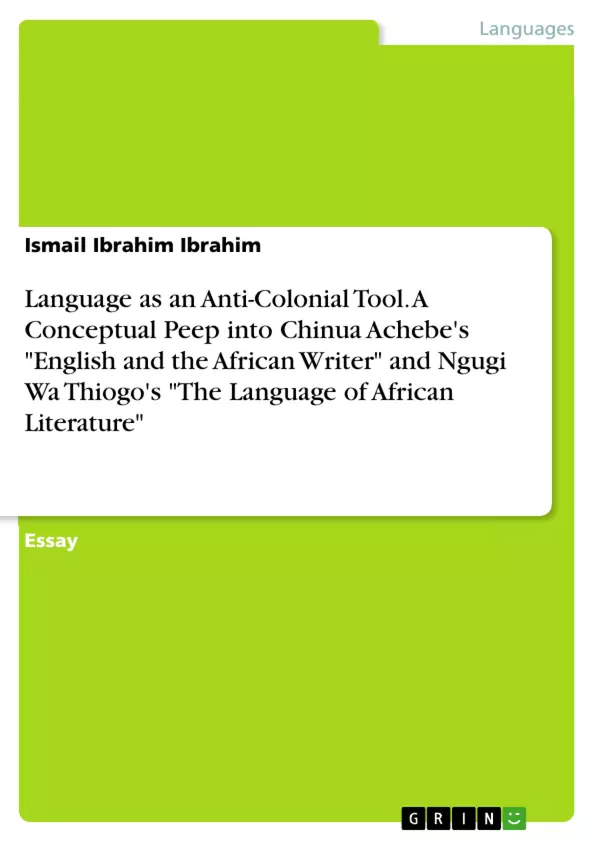This essay deals with language as an Anti-Colonial tool in Chinua Achebe's "English and the African Writer" and Ngugi Wa Thiogo‘s "The Language of African Literature"
The most powerful weapon through which the occident (the coloniser) grabs the orient (the colonised) is the language. Language is not just a means of communication, but also the spirit and a carrier of cultural experience and cosmology of the people.
It is an age-long tradition and one of the ways of the expansionists in which they impose their language as well as other cultural elements on the conquered people. However, the nexus between language and identity construction is undeniable.
Inhaltsverzeichnis (Table of Contents)
- Introduction
- Language of African Literature between Achebe and Ngugi
Zielsetzung und Themenschwerpunkte (Objectives and Key Themes)
This study explores the conceptual theories surrounding language resistance adopted by African postcolonial writers. It examines how these writers have used language as a tool for cultural liberation and the debate over the appropriate language for African literature.
- The role of language in cultural identities and the implications of colonialism.
- The use of English as a tool of cultural domination and the need for decolonization through language.
- The debate on the appropriate language for African literature: indigenous languages vs. "world languages."
- The impact of colonial language policies on education and intellectual development in Africa.
- The use of African ideas, philosophy, folklore, and imagery in literature.
Zusammenfassung der Kapitel (Chapter Summaries)
- Introduction: This chapter introduces the concept of language as a weapon of colonial domination and its impact on cultural identities. It highlights the significance of language in revealing cultural affinities and explores the concept of "domestication" of the English language by African writers.
- Language of African Literature between Achebe and Ngugi: This section delves into the debate over the appropriate language for African literature, focusing on the perspectives of Chinua Achebe and Ngũgĩ wa Thiong'o. It explores their views on the use of indigenous languages, the impact of colonial language policies on education, and the importance of cultural expression through literature.
Schlüsselwörter (Keywords)
This study focuses on key concepts such as post-colonialism, language resistance, decolonization, African literature, cultural identity, indigenous languages, "world languages," and the impact of colonialism on education and intellectual development.
Frequently Asked Questions
How is language used as a tool of colonialism?
Colonial powers imposed their languages to displace indigenous cultures and establish intellectual and cultural dominance over the colonized people.
What is Chinua Achebe's view on using English?
Achebe believed in "domesticating" English—using the colonial language but infusing it with African rhythms, idioms, and cultural experiences to reach a global audience.
Why does Ngũgĩ wa Thiong'o advocate for indigenous languages?
Ngũgĩ argues that language is the carrier of culture. He believes true decolonization requires writing in native African languages to reconnect with the people's spirit.
What is the link between language and identity?
Language shapes how people perceive their world and themselves. Forcing a foreign language on a people can lead to a fragmented cultural identity.
What is "postcolonial resistance" in literature?
It refers to the efforts of writers to reclaim their cultural heritage and challenge Western narratives through the creative use of language and indigenous imagery.
- Quote paper
- Ismail Ibrahim Ibrahim (Author), 2020, Language as an Anti-Colonial Tool. A Conceptual Peep into Chinua Achebe's "English and the African Writer" and Ngugi Wa Thiogo's "The Language of African Literature", Munich, GRIN Verlag, https://www.grin.com/document/1000165



